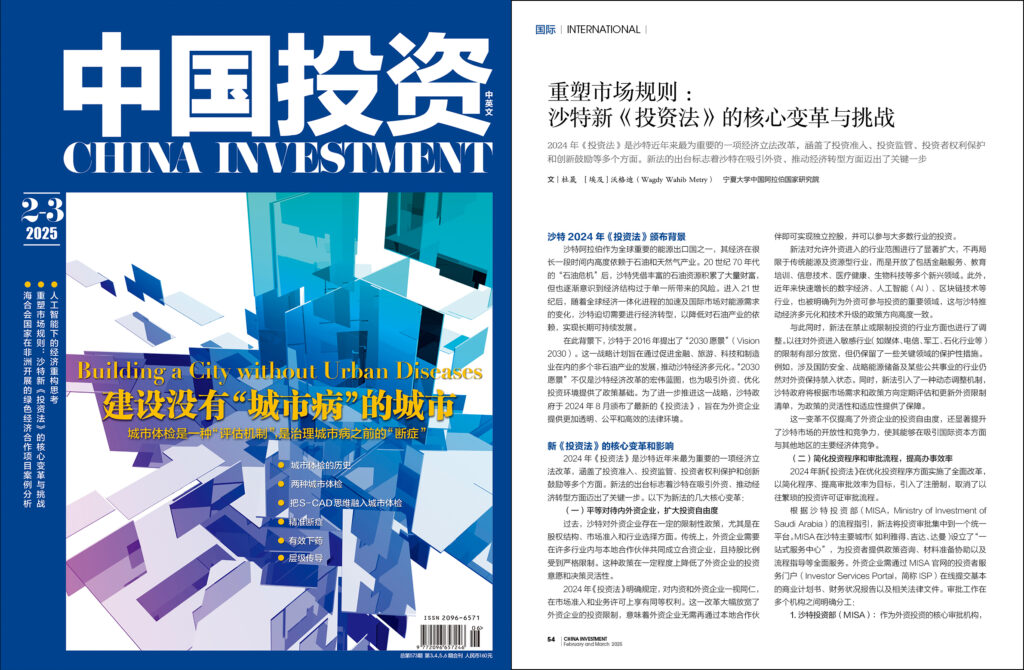
文|杜晟 [埃及]沃格迪(Wagdy Wahib Metry) 宁夏大学中国阿拉伯国家研究院
导读
●沙特2024年《投资法》颁布背景
● 新《投资法》的核心变革和影响
● 新法实施面临的挑战
● 总结与展望
沙特2024年《投资法》颁布背景
沙特阿拉伯作为全球重要的能源出口国之一,其经济在很长一段时间内高度依赖于石油和天然气产业。20世纪70年代的“石油危机”后,沙特凭借丰富的石油资源积累了大量财富,但也逐渐意识到经济结构过于单一所带来的风险。进入21世纪后,随着全球经济一体化进程的加速及国际市场对能源需求的变化,沙特迫切需要进行经济转型,以降低对石油产业的依赖,实现长期可持续发展。
在此背景下,沙特于2016年提出了“2030愿景”(Vision 2030)。这一战略计划旨在通过促进金融、旅游、科技和制造业在内的多个非石油产业的发展,推动沙特经济多元化。“2030愿景”不仅是沙特经济改革的宏伟蓝图,也为吸引外资、优化投资环境提供了政策基础。为了进一步推进这一战略,沙特政府于2024年8月颁布了最新的《投资法》,旨在为外资企业提供更加透明、公平和高效的法律环境。
新《投资法》的核心变革和影响
2024年《投资法》是沙特近年来最为重要的一项经济立法改革,涵盖了投资准入、投资监管、投资者权利保护和创新鼓励等多个方面。新法的出台标志着沙特在吸引外资、推动经济转型方面迈出了关键一步。以下为新法的几大核心变革:
(一)平等对待内外资企业,扩大投资自由度
过去,沙特对外资企业存在一定的限制性政策,尤其是在股权结构、市场准入和行业选择方面。传统上,外资企业需要在许多行业内与本地合作伙伴共同成立合资企业,且持股比例受到严格限制。这种政策在一定程度上降低了外资企业的投资意愿和决策灵活性。
2024年《投资法》明确规定,对内资和外资企业一视同仁,在市场准入和业务许可上享有同等权利。这一改革大幅放宽了外资企业的投资限制,意味着外资企业无需再通过本地合作伙伴即可实现独立控股,并可以参与大多数行业的投资。
新法对允许外资进入的行业范围进行了显著扩大,不再局限于传统能源及资源型行业,而是开放了包括金融服务、教育培训、信息技术、医疗健康、生物科技等多个新兴领域。此外,近年来快速增长的数字经济、人工智能(AI)、区块链技术等行业,也被明确列为外资可参与投资的重要领域,这与沙特推动经济多元化和技术升级的政策方向高度一致。
与此同时,新法在禁止或限制投资的行业方面也进行了调整。以往对外资进入敏感行业(如媒体、电信、军工、石化行业等)的限制有部分放宽,但仍保留了一些关键领域的保护性措施。例如,涉及国防安全、战略能源储备及某些公共事业的行业仍然对外资保持禁入状态。同时,新法引入了一种动态调整机制,沙特政府将根据市场需求和政策方向定期评估和更新外资限制清单,为政策的灵活性和适应性提供了保障。
这一变革不仅提高了外资企业的投资自由度,还显著提升了沙特市场的开放性和竞争力,使其能够在吸引国际资本方面与其他地区的主要经济体竞争。
(二)简化投资程序和审批流程,提高办事效率
2024年新《投资法》在优化投资程序方面实施了全面改革,以简化程序、提高审批效率为目标,引入了注册制,取消了以往繁琐的投资许可证审批流程。
根据沙特投资部(MISA,Ministry of Investment of Saudi Arabia)的流程指引,新法将投资审批集中到一个统一平台。MISA在沙特主要城市(如利雅得、吉达、达曼)设立了“一站式服务中心”,为投资者提供政策咨询、材料准备协助以及流程指导等全面服务。外资企业需通过MISA官网的投资者服务门户(Investor Services Portal,简称ISP)在线提交基本的商业计划书、财务状况报告以及相关法律文件。审批工作在多个机构之间明确分工:
1.沙特投资部(MISA):作为外资投资的核心审批机构,全面负责申请的初审工作,包括验证企业资质、审核提交材料的完整性与合法性。通过初审后,企业将直接获得基本的营业许可。
2.相关行业主管部门:针对某些特殊行业(如金融、能源、医疗健康),MISA的初审通过后,企业需向对应的行业主管部门申请进一步的专业评估。
金融行业:由沙特中央银行(SAMA)负责审批,以确保投资项目符合金融监管要求。
能源行业:沙特能源部需对投资项目的技术可行性及环保影响进行评估。
医疗健康行业:需通过沙特卫生部的审查,特别是涉及药品制造、医疗设备技术引进等领域的项目。
这一变革的实施将极大地提高沙特的投资效率,使得外资企业能够更快地进入市场,启动商业活动。新法实施前,企业通常需要数月时间完成跨部门审批。实施注册制后,标准申请流程大幅提速,通常可在4至6周内完成。对于高优先级项目(如技术创新或可再生能源领域),审批时间甚至可进一步缩短至2周,大大提升了投资便利性和效率。
(三)加强对投资者的权益保护,降低法律风险
新法特别强调了对外资企业合法权益的保护,旨在消除过去因政策变动而引发的法律风险。具体措施包括:
财产权保护:确保投资者资产不被随意征收或没收。
资金自由流动:投资者可自由转移资本和利润,减少外汇管制的风险。
法律支持:新法设立了专门的投资争议解决机制,投资者可以通过仲裁或沙特投资法庭迅速解决与政府或其他企业之间的商业纠纷。
这一措施对于吸引长期投资和高风险项目至关重要,因为外资企业通常在项目周期较长的情况下外资企业通常更关注投资环境的稳定性和法律保护。
(四)鼓励创新与技术引进
为促进经济多元化,沙特政府在2024年《投资法》中专门加入了支持创新和高技术产业发展的条款。沙特正在积极推动数字经济、人工智能(AI)、可再生能源、金融科技等领域的投资,鼓励外资企业将先进技术和管理经验引入沙特市场。
税收激励:沙特政府为创新型企业提供了一系列税收激励政策,特别是在高科技、可再生能源和环保领域。符合条件的企业可以享受最长10年的企业所得税减免,以及部分研发费用的税前扣除。
校企联合研发项目支持:沙特政府正在主要经济城市(如利雅得、吉达)设立创新产业园区,积极鼓励企业与大学共建研发实验室、技术孵化中心和行业研究基地。企业与高校合作开展研发项目时,可享受政府提供的土地优惠、低息贷款、专项资金等支持,研发项目所需的进口设备还可优先获得审批。与本地大学合作的企业可享受额外的研发费用税前扣除优惠,以及优先获得科研人才支持。
知识产权保护:新法规定,企业与本地机构合作研发的技术成果,其知识产权归合作双方共享。新法还强化了对外资企业知识产权的保护,特别是在专利、商标和商业秘密方面。沙特政府成立了专门的知识产权保护办公室,负责审查和处理知识产权纠纷案件,确保外资企业的技术和创新成果能够得到有效保护。
这些措施旨在吸引更多的科技型企业和创新型企业到沙特投资,并推动沙特本地的技术进步和产业升级。
新法实施面临的挑战
新《投资法》相关政策及配套措施的落地执行仍存在一定的挑战,外资企业在沙特投资和经营时需要谨慎应对。
实施细则的制定:当前部分实施细则的发布出现滞后,尤其在税收优惠、财政补贴等领域的具体操作指引不够明确,这将导致地方政府执行中出现偏差。《投资服务手册》作为重要的配套文件,尽管集成了政策信息,但在覆盖范围、实际操作的连贯性以及信息透明度方面未能完全达到预期,企业仍需面对审批时间延长和信息更新不及时的问题。
政策传导时间和效率:政策从中央政府传递到地方政府的过程中,通常需要经历解读、培训和落实等阶段。政策的落地可能不够统一或到位,对企业的计划和执行构成了潜在风险。
执行力度与政策评估:沙特中央政府的行政管理集中化,但地方政府的执行能力和资源配置相对不足,可能导致政策在地方实施过程中出现理解偏差或执行不力。加之缺乏独立的评估机制,可能进一步影响了新法的政策落地。
总结与展望
2024年《投资法》的颁布标志着沙特阿拉伯在推动经济改革和提升全球投资吸引力方面迈出了重要的一步。新法针对市场准入、投资者权益保护、法律程序简化以及创新技术引进等方面进行了系统性改革,为外资企业营造了一个更加开放、透明和高效的营商环境。通过新《投资法》的实施,沙特展现了其加快经济多元化转型的坚定决心,这不仅符合“2030愿景”的长期发展战略,也为未来的可持续经济增长奠定了法律和制度基础。
展望未来,沙特阿拉伯有望继续优化投资环境,通过加强与国际市场的合作,深化区域经济一体化,可以进一步巩固其作为全球投资者理想目的地的地位。特别是在科技创新、可再生能源和金融服务等新兴产业领域,沙特具备吸引全球领先企业投资的巨大潜力。

